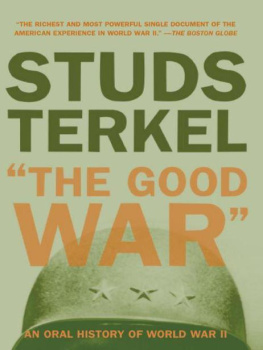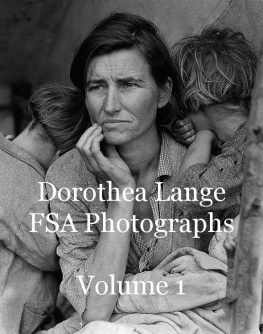Hard Times
Hard Times

Contents
Acknowledgments
FRIENDS, ACQUAINTANCES AND, IN astonishing number, strangers were gracious in offering suggestions. Without their hunches and tips, this work may not have been possible. Among these casual scouts: Richard Lamparski, Robert Cromie, Herman Kogan, Mike Royko, Lew Frank, Jr., Lucy Fairbank, Robert Sherrill, Phyllis Jackson, James Patton, Clifford and Virginia Durr, John Dierkes, Lou Gilbert, Phil McMartin, Sanka Bristow, Harry Bouras, King Solomon, Brendan McMahon, Earl Doty, Lou Abraham, Elizabeth Cooper, Jesse Prosten and Leon Beverly.
As in a previous work, Division Street: America, it was Cathy Zmuda who did more than transcribe the hundreds of thousands of spoken words onto pages. She offered gratuitous editorial comments and thus provided me with a perspective that might otherwise have been missing.
My colleagues at radio station WFMT, notably Norm Pellegrini, Ray Nordstrand and Lois Baum, were remarkably understanding and ingenious during my leaves of absence. My daily programs, re-broadcasts, had an air of contemporaneity, thanks to them. My gratitude, too, to Jim Unrath for beyond-the-call-of-duty chores as my companion and chauffeur, during a memorable trip through Arkansas.
Especially am I grateful to my editor, Andr Schiffrin, whose idea this was. His insistence and quiet encouragement are evident in all these pages. And to his perceptive associates Verne Moberg and Linda Faulhaber, for their bright-eyed look at what was becoming a burdensome mattera salute.
For my wife, my son, and my editor
1970, 1986 by Studs Terkel
All rights reserved.
No part of this book may be reproduced, in any form, without written permission from the publisher.
Requests for permission to reproduce selections from this book should be mailed to:
Permissions Department, The New Press, 38 Greene Street, New York, NY 10013.
Published in the United States by The New Press, New York, 2012 Distributed by Perseus Distribution
This is an abridged edition of Hard Times. The original edition included an additional sixty interviews.
CIP data is available
ISBN 978-1-5955-8858-6
Now in its twentieth year, The New Press publishes books that promote and enrich public discussion and understanding of the issues vital to our democracy and to a more equitable world. These books are made possible by the enthusiasm of our readers; the support of a committed group of donors, large and small; the collaboration of our many partners in the independent media and the not-for-profit sector; booksellers, who often hand-sell New Press books; librarians; and above all by our authors.
www.thenewpress.com
Book design by Lovedog Studio
Composition by Westchester Book Composition
This book was set in Fairfield Light
10 9 8 7 6 5 4 3 2 1
OTHER BOOKS BY STUDS TERKEL
American Dreams
Lost and Found
And They All Sang
Adventures of an Eclectic Disc Jockey
Studs Terkels Chicago
Coming of Age
Growing Up in the Twentieth Century
Division Street
America
Giants of Jazz
The Good War
An Oral History of World War II
Hope Dies Last
Keeping the Faith in Troubled Times
My American Century
Race
How Blacks and Whites Think and Feel About the American Obsession
The Spectator
Talk About Movies and Plays with the People Who Make Them
Talking to Myself
A Memoir of My Times
Will the Circle Be Unbroken?
Reflections on Death, Rebirth, and Hunger for a Faith
Working
People Talk About What They Do All Day and How They Feel About What They Do
Hard times come again no more...
AS THESE WORDS ARE being written, the Stephen Foster lyric rolls around in my head like a loose cannonball.
It is early in 1986, yet the Dirty Thirties come to mind. The bleak decade was so defined by a long-gone congressman, whose remembrances you will find in these pages.
How come this foreboding reflection? The Six Oclock News and the financial sections of our most respected journals inform us, via administration handouts, that things have seldom looked better. Even the phrase BOOM YEAR is occasionally headlined in a spirit of cheery prophecy.
True, there is the casual caveat, solemnly offered: something to do with deficits. But aside from the warnings of the usual Cassandras, its nothing to cause sleepless nights. Its too arcane a word anyway, an accountants term. Its nothing like hunger or homeless. These shadow words appear back in the feature pages, as human interest stories, adjacent to the gossip columns and theatrical news.
Up front are IMPORTANT developments. Look at the market. Stocks jump another 12... boosting the Dow Jones industrial average to a record and proving that optimism over economic growth and corporate earnings remains high. Look at Dow Jones. Look at the corporate ads, offered with an air of Responsibility. Look at the bright and morning faces of Business Administration School graduates, attach cases responsibly in hand, as they commute to the bustling office and the even more bustling floor.
Unavoidably, you look at the face of the farmer as he is caught by the TV camera. You know the one: the desperate Iowan, who killed his neighbor and himself. I believe a minor bank official got it, too. It wasnt his fault either. He was as distraught as the man who killed him. It was bigger than both of them.
Last month, in Union County, which has the richest land in South Dakota, a young Farmers Home Administration supervisor killed his wife, daughter, son and dog while they slept, then went down to his office and shot himself dead. He left a note: The job has got pressure on my mind, pain on left side.... Because he was an out-of-stater, the F.H.A. moved him about the state, apparently figuring he would be more willing to get tough with local farmers who were behind on their loan payments than would a native South Dakotan.
Who do I shoot? cried out Muley Graves, Steinbecks near-crazed Okie, as he was being bulldozed off the land. God, I dont know, replied the towns bank officer, who was going sort of crazy himself.
Muley was a small farmer of the thirties. The Iowan was a small farmer of the eighties. Though a half-century separates them, their tethers end was commonly caused: neither could meet the payments.





